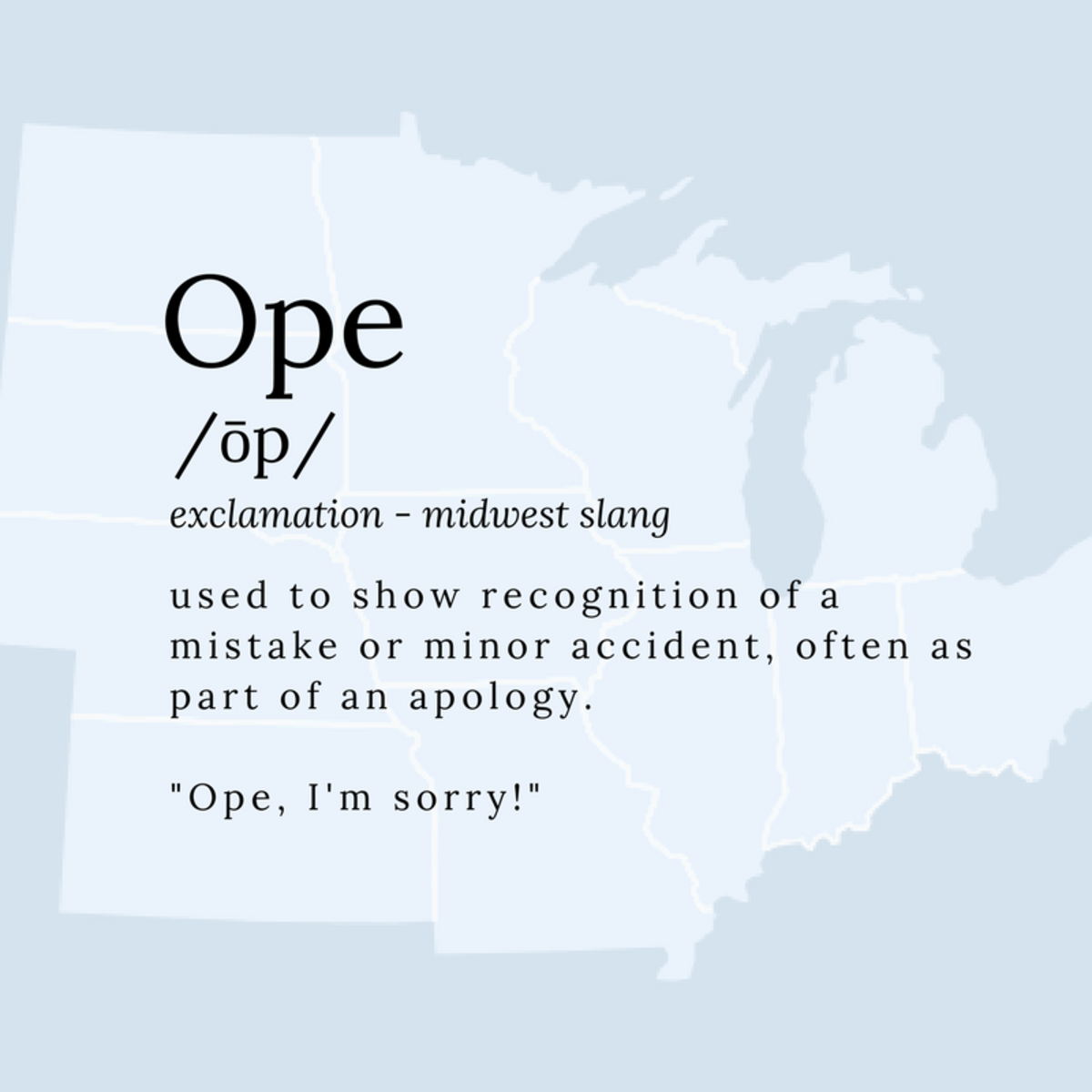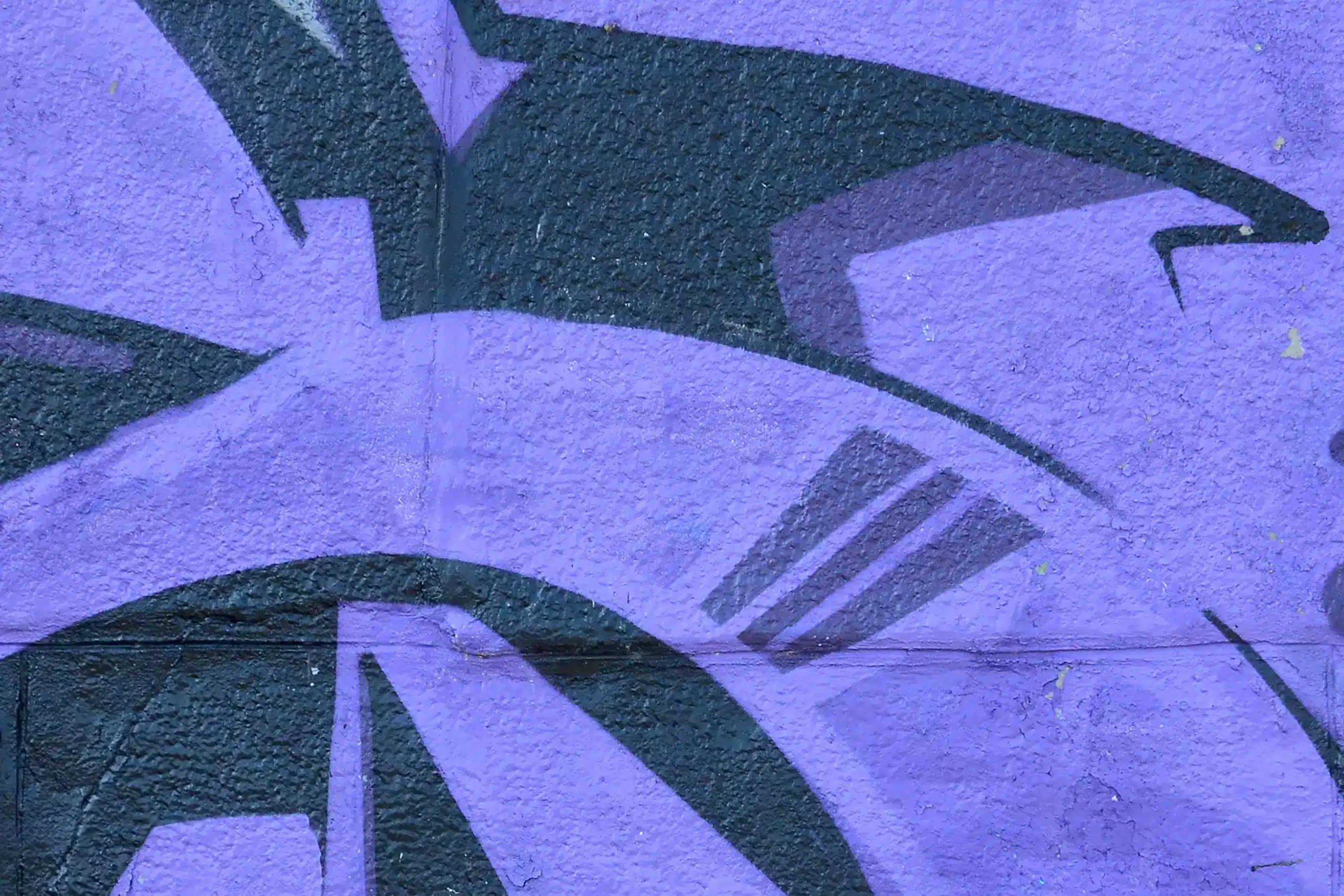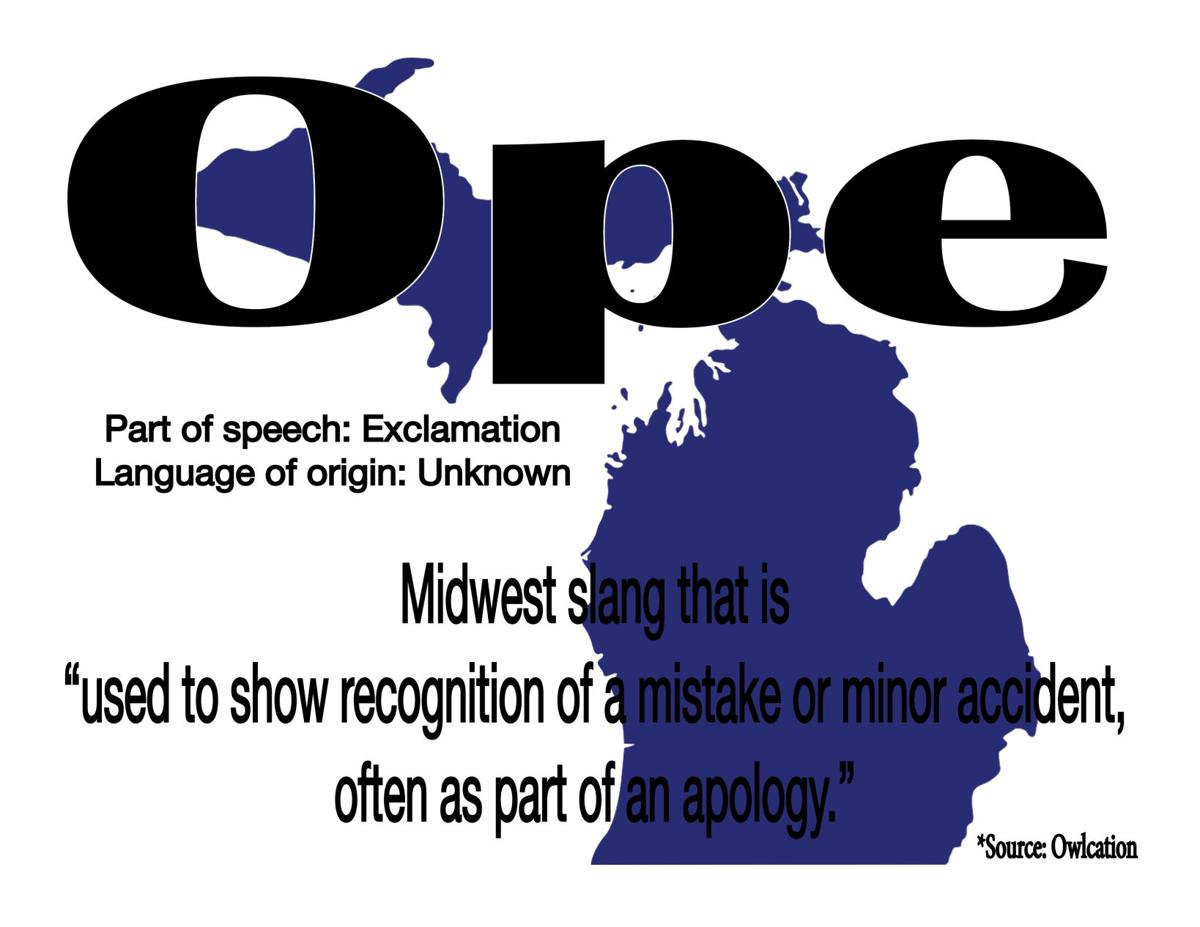Ope Meaning - What's The Deal With This Midwestern Word?
Have you ever been walking along, perhaps in a grocery store aisle, and suddenly, you find yourself almost bumping into someone? Or maybe you hear a quick, soft sound from someone nearby, a sort of little exclamation that just seems to fit the moment. That sound, that quick little word, might very well be "ope." It's a term that has, in a way, really taken hold in conversation lately, especially when you are spending time in the central parts of the United States. It is, you know, a sort of verbal shrug, a quick acknowledgment of a tiny, everyday happening.
This simple utterance, "ope," is something that has, apparently, become quite a mark of the Midwest. It’s not just a passing trend, either; it seems to be a real part of how people there talk and react to small, unexpected things. For folks who live in places like Minnesota, or really anywhere in that general area, hearing "ope" is just, like, a common sound. It pops up in all sorts of little moments, often when something slightly out of the ordinary happens, or when someone needs to make a quick, quiet apology for a minor slip-up.
So, what exactly is the deal with this particular word? Where did it come from, and why is it so often heard in that part of the country? We are going to, you know, look into what "ope" truly means, where it might have started, and how people use it in their daily chats. It’s a pretty interesting little piece of language, really, and it tells us a bit about how we communicate without even thinking too much about it.
Table of Contents
- What is Ope Meaning?
- Where Does Ope Meaning Come From?
- How is Ope Meaning Used in Everyday Life?
- Ope Meaning and Social Moments
- Is Ope Meaning Just Another Way to Say Oops?
- The Midwest and Its Connection to Ope Meaning
- Ope Meaning as an Apology
- Examples of Ope Meaning in Action
What is Ope Meaning?
So, what is this "ope" word all about? Well, it's pretty much a short, quick sound that people make, often when they are a little bit surprised or when something just happens unexpectedly. It's, you know, not a word you typically write down in a formal letter, but you hear it a lot in everyday talking. Think of it as a small, verbal signal that says, "Whoops, something just happened." It's a bit like a tiny, spoken exclamation point for minor events.
This little sound, "ope," has, in some respects, become a really common way for people to react to things. When you're just going about your day, and something small catches you off guard, this is the sort of thing you might say. It’s a very casual way to express a momentary feeling, a quick thought that doesn't need a lot of words. It’s a word that, as a matter of fact, seems to fit those little, almost unnoticed, interactions we have all the time.
It's also, you know, a sort of quick interjection. An interjection is a word or a sound that expresses a feeling or a reaction. "Ope" fits that description perfectly. It’s something you just blurt out, without really thinking about it too much, when a situation calls for a small, immediate response. It’s a word that, in a way, just pops out.
Where Does Ope Meaning Come From?
Now, when we talk about where "ope" comes from, it's pretty interesting. You might think it's just a shortened version of "oops," but that's not actually the case. A professor who studies language has looked into this, and what they say is quite telling. They point out that it's more like "oops" is a written way to show that sound, that quick utterance we make. So, it's not that "ope" came from "oops," but rather, "oops" is, in some respects, the word we use on paper to represent the sound that is "ope."
It’s a bit like how we might write down a cough or a sneeze; the written word is just trying to capture the sound itself. So, this professor explains that the sound, "ope," was probably around first, as a natural human reaction. Then, when people needed to put that sound into words, they came up with "oops" as a way to spell it out. It’s a subtle difference, but it really changes how we think about the origin of this particular expression.
So, basically, the sound itself is the original thing. It's a natural, almost involuntary little noise we make. And then, over time, we found a way to put it into letters, to give it a written form. That written form, as a matter of fact, became "oops." It’s pretty neat to think about how our spoken language can, you know, influence the words we eventually write down.
How is Ope Meaning Used in Everyday Life?
"Ope" is, you know, something you hear quite a lot in everyday conversations. It’s especially common in those little moments where things are just a bit awkward, or when something unexpected happens. Think about those minor social inconveniences that pop up all the time. Like, if you are trying to walk past someone in a narrow space, and you almost bump into them, that’s a time you might hear "ope." It’s a quick, quiet acknowledgment of the situation.
It’s also used when you are, perhaps, a little bit surprised by something. Maybe you open a door, and someone is standing right on the other side. A quick "ope" might just slip out. It’s a way to show a mild, immediate reaction to something that wasn't quite what you expected. It's a very simple sound, but it carries a lot of meaning in these kinds of moments.
Another time you might hear it is when something is, in a way, unexpectedly funny, or even a little bit over the top in its humor. If someone tells a joke that catches you off guard and makes you laugh in a surprised way, you might just let out an "ope." It’s a sort of quick, almost involuntary sound that shows you’ve been taken by surprise, even by something humorous.
Ope Meaning and Social Moments
The term "ope" is, you know, often heard during those little social interactions that happen all the time. It’s a quick verbal cue that helps people manage small, everyday situations. When you are, for example, walking through a crowded place, and you need to get by someone, you might say "ope" as you try to squeeze past. It’s a way to let the other person know you’re there, and you’re just trying to get through, without making a big fuss.
It’s also a sound that people often make when they are reacting to something that wasn't quite planned. Like, if you accidentally knock a pen off a table, or if you reach for something at the same time as someone else, an "ope" might just come out. It’s a very common expression of surprise, especially among people who live in the Midwest. It’s a simple way to acknowledge a small, unexpected event without needing to say a whole sentence.
These are the sorts of situations where "ope" really shines. It’s a quick, almost automatic response to those tiny little things that happen in our daily lives. It’s a way to, you know, signal that something has just occurred, and you’ve noticed it, and you’re perhaps a little bit surprised or are making a quick adjustment. It’s a very human sound, really.
Is Ope Meaning Just Another Way to Say Oops?
You might wonder if "ope" is just, you know, another way to say "oops," or perhaps "ugh," or even "uh huh." Some people do suggest that it fits into those categories. And in many ways, it does share some common ground with those other little words. For instance, like "oops," "ope" is often used when you've made a tiny mistake, or when something has gone a little bit wrong, even if it’s not a big deal.
However, there's a subtle difference, too. While "oops" might be a general expression of a small error, "ope" often has a more immediate, almost physical quality to it. It’s that sound you make when you almost trip, or when you nearly drop something. It’s a quicker, perhaps more reflexive sound than a fully formed "oops." It’s a very quick, very spontaneous sort of noise.
And it’s certainly different from "ugh," which usually shows frustration or annoyance, or "uh huh," which is more of an agreement or acknowledgment. "Ope" is more about that quick, mild surprise or a small, immediate adjustment. So, while it shares some territory with those other words, it really has its own distinct flavor and use. It’s a word that, in a way, stands on its own.
The Midwest and Its Connection to Ope Meaning
It’s pretty clear that "ope" is very much connected with the Midwest, especially places like Minnesota. If you spend time in that part of the country, you’ll probably hear it quite a lot. It’s become a sort of, you know, signature word for folks from that area. It’s almost like a little linguistic handshake, a sign that you understand the casual, friendly way of life there.
People from the Midwest, it seems, just naturally use "ope" in their daily talk. It’s not something they probably even think about; it just comes out. This word is, in some respects, a common expression of surprise among people from that region. It’s a part of the local way of speaking, a little piece of their unique communication style.
This association is so strong that if you say "ope" to someone from the Midwest, they’ll probably, you know, know exactly what you mean, and they might even recognize you as someone who understands their way of talking. It’s a word that really highlights the regional differences in how we speak, and how certain words can become tied to specific places.
Ope Meaning as an Apology
In the Midwest, if you say "ope" to someone, you are, you know, quite likely offering a quick apology for something you’ve done, even if it’s a very small thing. It’s a way to say "excuse me" or "sorry" without having to use those exact words. It’s a sort of gentle, understated way to acknowledge a minor mistake or a slight social misstep.
For example, if you are reaching for something at the same time as someone else, and your hands brush, a quick "ope" can serve as a polite, immediate apology. It’s a way to smooth over those tiny, everyday awkward moments without making a big deal out of them. It’s a very common way to, you know, show that you are being considerate of others.
It’s used in contexts where you might otherwise say "excuse me," "sorry," or "oops." So, if you accidentally bump into someone, or if you step in front of them for a second, "ope" fits right in. It’s a versatile little word that handles a lot of those polite, brief interactions we have all the time. It’s a word that, as a matter of fact, helps keep things friendly and easy.
Examples of Ope Meaning in Action
To give you a better idea of how "ope" is used, let's look at some examples. Imagine you are, you know, trying to get past someone in a narrow hallway. You might lean slightly and say, "Ope, just gotta sneak by you." This shows you’re trying to be polite and let them know you’re there, trying to pass without causing a fuss. It’s a very common sort of situation for this word.
Another example: you’re carrying a box, and you almost drop it. As you quickly steady it, you might let out a little "ope." This shows that you were a bit surprised by the near-miss, and you’ve reacted quickly. It’s a quick, almost automatic sound that just pops out. It’s a very, very natural response to a sudden, small event.
Or, think about when you are opening a door, and someone is right on the other side, and you almost hit them. A quick "Ope!" might come out of your mouth. This is an expression of surprise, a way to show you didn't expect them to be there. It’s a sort of immediate, verbal reaction to something that was not planned.
The word "ope" is considered a Midwestern thing, and it’s often spoken out loud when people are reacting to something they didn’t see coming. It’s a simple sound, but it carries a lot of meaning in these kinds of moments. It’s a word that, in a way, just fits so many small, everyday situations.

The Midwest Accent Explained (With Slang and Examples) - Owlcation

Understanding the Slang Meaning of 'Ope' - SlangSphere.com

'Ope' for us | Local News | record-eagle.com